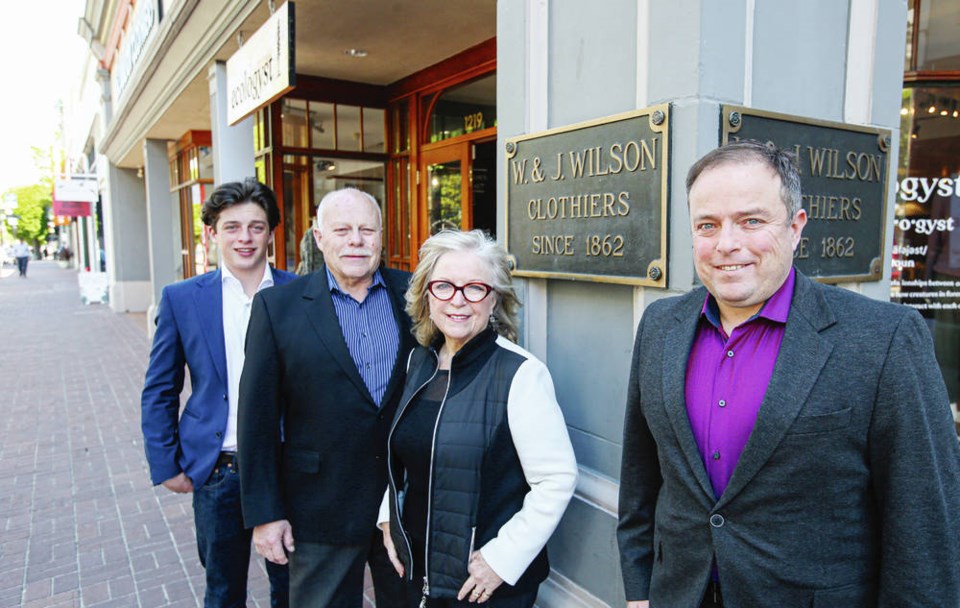W&J Wilson has been around as long as the city itself, clothing gold miners and settlers, famous founding fathers and then generations of residents and tourists from its historic store on Government Street.
But by the end of summer, North America’s oldest family-run clothing store will shutter its downtown shop and consolidate in its satellite stores in the suburbs.
The closing will end an incredible 159-year downtown run for W&J Wilson, spanning seven generations split between two families. The store, on the original site a few steps from the walls of where the Fort Victoria trading post once stood, is being put up for lease by descendants of the Wilson family who still own the property and now live in Vancouver.
The Thompson family, which has owned the business since 1956, said a combination of factors played a role in their decision to close, citing changing demographics and clothing preferences, increased panhandling and crime, and their loyal customer base saying they would rather shop in the Sidney or Oak Bay stores than venture downtown.
The pandemic took its toll on the downtown location as tourism dried up and special events like graduations and weddings that require suits and ties, and dresses withered over the past year. “We really aren’t doing much business downtown now,” said Scott Thompson, who owns W&J Wilson with his parents, Tom and Cathie. “In any business, you have to make changes along the way.”
Tom Thompson, who started in the business dressed in a bellboy uniform offering perfumes and opening doors for customers, said it was a bittersweet decision not to renew the downtown lease.
“Between COVID and the downtown not being attractive to our customers anymore, we made the decision,” he said. “It was a very good run there … 160 years is quite something for any business … but our customers say they just don’t want to come downtown anymore.
“That’s why we’re so fortunate to have our Oak Bay and Sidney stores.”
While larger chain stores moved into downtown over the years and smaller boutique shops have come and gone, W&J Wilson became a clothing landmark. The Thompsons continued in the founders’ footsteps by sourcing their clothing lines directly from European manufacturers.
It’s helped the Thompsons maintain high-quality clothing brands, and eliminate middle suppliers that often add costs that end up on consumer price tags.
Cathie and Scott Thompson, who make regular buying trips to Europe to stock the stores, have forged long-standing buying arrangements and relationships with some of Europe’s most noted designers and manufacturers that have helped keep the supply chain going, even through the pandemic.
William Wilson, the son of a London silk merchant founded the store in 1862 at age 24, by getting off at the wrong port. Wilson thought he would be landing at New Westminster, where he would have a springboard to the Cariboo gold rush. But the ship that carried Wilson and his 18 trunks of clothing around the horn stopped in Victoria instead.
Transporting the trunks to Barkerville proved too expensive for Wilson. The cost of renting nine camels would have broken him. So Wilson consigned the dry goods to merchant Hardy Gillard, who sold the goods but never paid him. Wilson bought Gillard’s business out of bankruptcy soon after.
Brother Joseph Wilson arrived two years later with a massive load of clothes and W. & J. Wilson was born, its inventory guaranteed by father Joseph Sr. in London, who had become the sons’ purchasing agent.
William Wilson did make his way to the Cariboo the next spring and spent summers there for four years, discovering enough gold to keep the inventory coming from overseas.
The founder went on to serve on the school board and as a member of the provincial legislature from 1878 to 1882. The family also started a wholesale grocery business in Victoria.
W. & J. Wilson was handed down to Joseph Jr.’s son, and then to his offspring Harold, whose sons Alan and Ron still own the building today.
Robert Thompson, along with partner Bill Clark, bought into the business with Harold Wilson in 1956.
A 24-year-old Tom Thompson took out a bank loan in 1972 to buy Harold Wilson’s shares and the second family of the landmark business took root.
The store sold socks to British Columbia’s founding father, James Douglas, and outfitted hanging judge Matthew Begbie with deerskin gloves and silk umbrellas and helped Bishop Edward Cridge, the Hudson’s Bay Company’s first Anglican chaplain, ward off cold pioneer nights with flannel drawers.
And it evolved with the city and the times, providing fashions for men and women as well as tailoring services.
At one point the Thompsons expanded W&J Wilson to seven stores, including shops in high-end hotels as far east as Lake Louise, Alta.
The Wilson store used to cover twice the square footage it does now. Wilson’s had expansions in the 1870s and 1912 that stretched the building to Government Street. The basement once held children’s clothing. The store was reduced to its current footprint in the 1980s, and the basement is now used for offices, stock and tailoring.
A thick brick vault with heavy steel doors in the basement was once crammed with historic business ledgers. It was emptied in 1991 when the Thompsons donated paperwork and photos to the city and provincial archives, with information on who bought what and when from 1862 to 1960, including many of Fort Victoria’s founding families.
“There are tough changes you have to make running a business,” said Scott Thompson.
He said maintaining locations in Oak Bay Village and downtown Sidney that meet the demands of customers has to come first.



